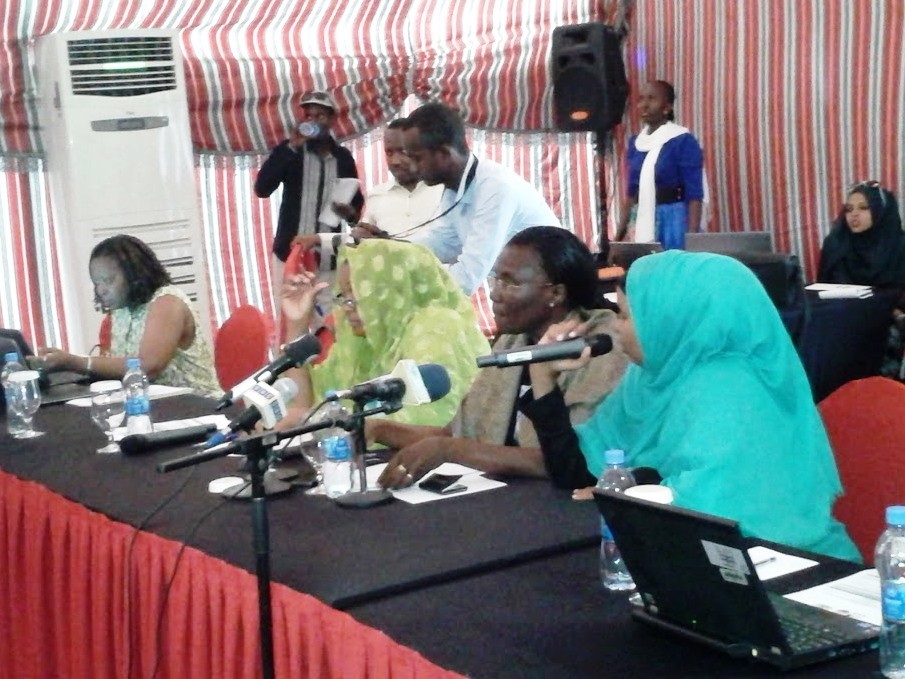n the quest to ratify the Convention on the Elimination of all Forms of Discrimination Against Women (CEDAW), the Federal Government of Somalia (FGS) conducted a technical capacity building training for directors and technical staff of 19 government line ministries and government institutions in August. The training focused on understanding the provision of CEDAW; article by article, its optional protocol and ratification and reporting processes.
Led by the Ministry of Women and Human Rights Development (MoWHRD) of the Federal Government of Somalia, the training attracted the participation of 28 top government officials, delegates from the African Union Mission to Somalia (AMISOM) and members of the Somalia Gender-Based Violence (GBV) Working Group.
UNFPA provided technical and financial support towards the training. UNFPA Somalia acting representative Ms. Grace Kyeyune said at the opening of the training it was important for participants to review all the articles of the CEDAW so that they understand them and define the recommendations for the way forward as they move towards ratification of the convention.
"The CEDAW has the backing of people from diverse walks of life. It provides the background for protecting the rights of women and girls as they are the mothers of all nations. The basis of equality of women, men, girls and boys is a society that is free from discrimination," said Ms. Kyeyune.
The UNFPA Acting Representative said it was expected that the training would define an action plan and recommendations for ratification of CEDAW.
"A key factor for UNFPA is addressing the major issues affecting women and girls such as early marriage and lack of education," said Ms. Kyeyune, adding: "at UNFPA, we are committed to supporting the Federal Government in this process".
Vice Minister for MoWHRD Honourable Mumino Sheik Omar said the FGS was appreciative of the training as it was relevant to the needs of Somali people.
"The Federal Government of Somalia is committed to achieving the ratification of CEDAW. We want to be like Jordan and Morocco, which are in our region and have ratified the convention," said Honourable Omar.
She said it was important for the participants to understand the process of ratification and full domestication process of CEDAW, country reporting process and ensuring collective national response to the expected deliverables of the convention.
The MoWHRD is mandated to promote gender equality and women's empowerment by ensuring that it is mainstreamed across the government and to advocate for the legislation and implementation of laws, policies and actions as mandated by the CEDAW.
One of the key outcomes of the capacity building training was the establishment of the Somali CEDAW technical advocacy committee, with representation from members of the directors from all line ministries. A clear draft road map was also discussed in the ratification process, and an implementation plan to systematically and collectively act on the expected deliverables of the convention was developed.
The advocacy committee, established with the leadership of the deputy minister of MoWHRD, agreed to lead in educating Somalis and policy makers on the convention, advocate for the speedy ratification of CEDAW and its optional protocol, and ensuring its full implementation based on the national implementation plan of CEDAW and hold advocacy forums and meetings to track the progress made on the planned ratification road map and implementation plan.
The committee will also work towards ensuring that all the 16 substantive articles of CEDAW are acted on and reported by each line ministry and institution, encourage NGOs to start focusing their development and humanitarian interventions with full integration of the CEDAW Provisions, hold joint reviews on the implementation of the ratification road map and implementation plan on CEDAW and its optional protocol. It will also provide technical guidance to their respective ministries, partners and institutions on the full implementation of CEDAW in their respective plans and reporting.
The CEDAW, adopted in 1979 by the UN General Assembly, is often described as an international bill of rights for women. Consisting of a preamble and 30 articles, it defines what constitutes discrimination against women and sets up an agenda for national action to end such discrimination.

By accepting the Convention, states commit themselves to undertake a series of measures to end discrimination against women in all forms, including to incorporate the principle of equality of men and women in their legal system, abolish all discriminatory laws and adopt appropriate ones prohibiting discrimination against women; to establish tribunals and other public institutions to ensure the effective protection of women against discrimination and to ensure elimination of all acts of discrimination against women by persons, organizations or enterprises.
Countries that have ratified or acceded to the Convention are legally bound to put its provisions into practice. They are also committed to submit national reports, at least every four years, on measures they have taken to comply with their treaty obligations.
by Pilirani Semu-Banda:[email protected], UNFPA Somalia Communication Specialist


